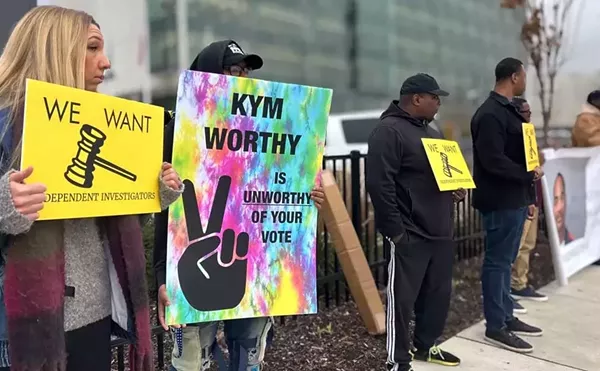
Audio By Carbonatix
[
{
"name": "GPT - Leaderboard - Inline - Content",
"component": "35519556",
"insertPoint": "5th",
"startingPoint": "3",
"requiredCountToDisplay": "3",
"maxInsertions": 100,
"adList": [
{
"adPreset": "LeaderboardInline"
}
]
}
]
Unlike fine wine, the years haven’t done much mellowing at Labor Notes. Even after two decades of raising Cain in union circles, the in-your-face bristle still leaps from the pages of this scrappy newsletter.
Look back 20 years, when Labor Notes published its first issue out of cramped offices in the back hallway of a cooperative print shop at Woodward and McNichols. The front page headline read, "Teamster Dissidents Doing Well in Local Union Elections." Under the masthead appeared the slogan, "Let’s put the Movement Back in the Labor Movement."
Now jump ahead two decades to the March 1999 issue, No. 240: "Four Killed in Ford Power Plant Blast" written by a veteran member of UAW Local 600. Accompanying it on the page are stories about the successful campaign to free imprisoned leaders of a Mexican teachers union and a piece that focuses on an SEIU (Service Employees International Union) local president alleged to have mob connections and a dictatorial style.
Obviously, this monthly publication is not your average see-no-evil, leadership-knows-best union paper.
Fierce in its opposition to corruption, the publication was forged in the fires of reform and keeps pounding away at the issues relentlessly, hammering the bad guys and giving support to the rank-and-file fighting for a fair shake.
"In the wake of scandal, and in the midst of several investigations, reformers in the 56 locals of AFSCME District Council 37 in New York City are rolling up their sleeves for the tough job of cleaning up their union," informs the lead paragraph on a typical story in the most recent issue.
And then there’s the reappearance of an old name with a new face over at the Teamsters: "Even before taking office, Hoffa Jr. is bringing back multiple salaries and meetings at Florida resorts," warns Labor Notes.
But the newsletter’s reporting reflects something more than a "the more things change, the more they stay the same" scenario. The growth of Labor Notes itself is proof of that.
"We started as a tiny newsletter that went out to about 300 people," recalls Jim West, editor of Labor Notes at its inception and now co-editor with Martha Gruelle. "Now our circulation is 11,000. I think our emphasis on reforming the labor movement — more democracy, more activism, resisting concessions and cooperation with management — has had some impact on the changes we’ve seen in labor at the grassroots level."
Continuing along those lines, Gruelle and writer Mike Parker have just co-authored Democracy is Power, intended as a handbook for union members working to open up the unions to control from below. This is the latest book from the nonprofit Labor Education and Research Project, which also publishes Labor Notes.
LERP Director Kim Moody sees the newsletter as "part of a broad and growing trend of union activists working to change the labor movement. This current seeks a unionism of the members and by the members — but for all working people.
"It is a unionism that builds democratically in the workplace, but reaches out to other unions, communities and workers in other unions. It’s a current that didn’t exist 20 years ago, and Labor Notes is proud to have helped build it over the years."
"For Labor Notes to have survived as long as it has is a real testament to their steadfastness," observes John Beck, an associate professor with the Labor Education program at Michigan State University.
However, it’s not a publication without problems, Beck adds.
"I’m sure there’ve been times that they’ve gored somebody’s ox, leaving that person feeling like they’ve been treated unfairly. There’ve been times when they’ve staked out an antiauthroitarian position where people in authority can do no right and the rank-and-file can do no wrong.
"But they couldn’t have been effective unless they were goring somebody’s ox once in a while. And they’ve done a tremendous job keeping out in front on issues, forcing the mainline labor movement to catch up."
How much the publication has changed depends partly on perspective. For example, when Labor Notes began publication the United Mine Workers had just conducted a victorious national strike, including defiance of a Taft-Hartley back-to-work order from President Jimmy Carter. Just a couple years later came the crushing of the air traffic controllers’ union PATCO by President Ronald Reagan, putting every potential strike under the cloud of "permanent replacement workers," and setting the stage for a decade of wage concessions.
The late 1990s have seen the successful United Parcel Service strike, in which the Ron Carey administration in the Teamsters mobilized the membership and reached out to the public, embracing the "current" described by Moody. At the same time, the Detroit Newspapers strike has produced a nearly four-year stalemate — and Carey’s Teamster reform leadership was removed in the wake of an illegal re-election financing debacle.
"We are aware," says Moody, "that movements rise and fall, people come and go, and history throws a curveball every now and then.
"Nonetheless, we see a labor movement that is struggling with itself to change. We also see a big shift in public opinion that now sympathizes with strikes like those at UPS and General Motors last summer. More people seem to be sick of the political right wing and of pro-business politics in general."
To sustain the movement, Labor Notes organizes national conferences every two years to bring together a cross section of active unionists and pro-labor organizers. The 10th conference, to be held this week and marking the publication’s two decades of activity, is titled "Democracy is Power: Building Our Unions from Below."
Featured speakers are to include Tom Leedham, the reform candidate in the 1998 Teamsters election; Marvin Surkin, co-author of the newly republished classic book Detroit: I Do Mind Dying; representatives of the Frente Autentico del Trabajo (FAT); the independent union federation in Mexico; and Saladin Muhammed of Black Workers for Justice.
The real heart of the conference at the RenCen Marriott, however, will be several dozen workshops ranging on topics both broad (corporate campaigns, racism on the job, the Asian and Russian crises) and specialized (what do after winning union office, cross-border organizing, in-plant strategies, etc.).





